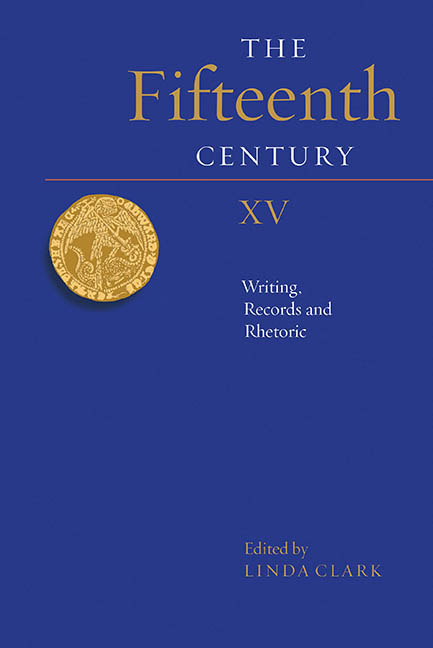Book contents
- Frontmatter
- Contents
- List of Illustrations
- Contributors
- Preface
- Abbreviations
- The Libelle of English Policy: The Matter of Ireland
- ‘Stories of Divers Regions and Provinces’: Some Digests of History and Geography for Late-Medieval English Readers
- ‘To please … Dame Cecely that in latyn hath litell intellect’: Books and the Duchess of York
- A Case Study in Lancastrian Service and Personal Survival: The Career of William, Lord Roos of Helmsley (c.1370–1414)
- Identity, Discourse and Political Strategy: Margrave Albrecht Achilles (1414–86) and the Rhetoric of Antagonism between Town and Nobility in Upper Germany
- The Redistribution of Forest Law and Administration in Fifteenth-Century England
- Well-Connected and Qualified Clerics? The Bishops of Dunkeld and Sodor in the Fifteenth Century
- Preaching Politics: Lancastrian Chancellors in Parliament
- Bishop John Alcock and the Roman Invasion of Parliament: Introducing Renaissance Civic Humanism to Tudor Parliamentary Proceedings
- Preaching on Magna Carta at the end of the fifteenth century: john alcock's sermon at paul's cross
- Index
- CONTENTS OF PREVIOUS VOLUMES
Preaching on Magna Carta at the end of the fifteenth century: john alcock's sermon at paul's cross
Published online by Cambridge University Press: 23 August 2019
- Frontmatter
- Contents
- List of Illustrations
- Contributors
- Preface
- Abbreviations
- The Libelle of English Policy: The Matter of Ireland
- ‘Stories of Divers Regions and Provinces’: Some Digests of History and Geography for Late-Medieval English Readers
- ‘To please … Dame Cecely that in latyn hath litell intellect’: Books and the Duchess of York
- A Case Study in Lancastrian Service and Personal Survival: The Career of William, Lord Roos of Helmsley (c.1370–1414)
- Identity, Discourse and Political Strategy: Margrave Albrecht Achilles (1414–86) and the Rhetoric of Antagonism between Town and Nobility in Upper Germany
- The Redistribution of Forest Law and Administration in Fifteenth-Century England
- Well-Connected and Qualified Clerics? The Bishops of Dunkeld and Sodor in the Fifteenth Century
- Preaching Politics: Lancastrian Chancellors in Parliament
- Bishop John Alcock and the Roman Invasion of Parliament: Introducing Renaissance Civic Humanism to Tudor Parliamentary Proceedings
- Preaching on Magna Carta at the end of the fifteenth century: john alcock's sermon at paul's cross
- Index
- CONTENTS OF PREVIOUS VOLUMES
Summary
‘He that hath ears to hear, let him hear.’ Few gospel passages seem more fitting as a sermon text than Luke 8:8, which introduces the parable of the sower, for the seed that falls on stony or on fertile ground is the word of God. Towards the end of the fifteenth century, John Alcock based an elegant and distinctive sermon at Paul's Cross on that text. Bishop Alcock's sermon was conceptually rich. A complex analogy between the Church and secular government provided the unifying idea. Specifically, the sermon made play on the king's chancery and its productions: Christ's injunctions were likened to royal proclamations, to both of which pronouncements Alcock's audience should listen attentively. The legal privileges that officers in chancery enjoyed were paralleled in those privileges that clergymen ought to have been enjoying. Magna Carta, the sermon insisted, guaranteed all ecclesiastical liberties to which the Church laid claim. This argument is not the sermon's only interesting feature. Conceivably, Alcock's address provides the sole surviving example of a sermon preached at Paul's Cross in the late fifteenth century; certainly, it was one of the very first sermons to have been printed. Such a noteworthy sermon deserves full discussion. The first half of this article considers the preacher, his pulpit and the sermon's printing. The second half explores the sermon's content in the context of relations between clergy and laity and between Church and state.
John Alcock had risen to prominence as a Yorkist civil servant: he had graduated from chancery to the bishopric of Rochester in 1472, served two unfortunate princes of Wales (Edward V and Arthur), twice deputised as chancellor in the 1470s, and briefly held the same position at the start of Henry VII's reign until the return of John Morton, whom he succeeded as bishop of Ely in October 1486. We know of some other occasions on which Alcock preached. At his installation as bishop of Worcester in 1476, he delivered a sermon, as was conventional, on the gospel Ego sum pastor bonus. He preached at the opening of parliament in 1472 and in 1485. During Henry VII's first progress in May 1486, Alcock gave ‘a bref and a fructifull sermonde’ in his cathedral of Worcester and also at Gloucester and Bristol, expounding the papal bull confirming the king's title. Alcock was esteemed for his preaching.
- Type
- Chapter
- Information
- The Fifteenth Century XV , pp. 169 - 190Publisher: Boydell & BrewerPrint publication year: 2017

